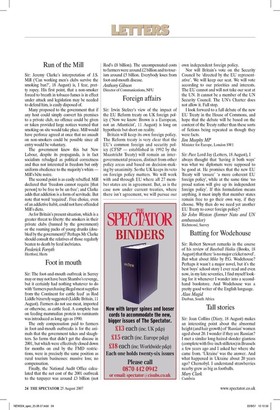Foreign affairs
Sir: Irwin Stelzer's view of the impact of the EU Reform treaty on UK foreign policy (Now we know: Brown is a European, not an Atlanticist', 11 August) is long on hypothesis but short on reality.
Britain will keep its own foreign policy. The Reform treaty is very clear that the EU's common foreign and security policy (CFSP — established in 1992 by the Maastricht Treaty) will remain an intergovernmental process, distinct from other policy areas and based on decision-making by unanimity. So the UK keeps its veto on foreign policy matters. We will work with and through EU where all 27 member states are in agreement. But, as is the case now under current treaties, where there isn't agreement, we will pursue our own independent foreign policy.
Nor will Britain's vote on the Security Council be 'directed by the EU representative'. We will keep our seat. We will vote according to our priorities and interests. The EU cannot and will not take our seat at the UN. It cannot be a member of the UN Security Council. The UN's Charter does not allow it. Full stop.
I look forward to a full debate of the new EU Treaty in the House of Commons, and hope that the debate will be based on the content of the Treaty rather than these sorts of fictions being repeated as though they were facts.
Jim Muiphy MP Minister for Europe, London SW1 Sir: Pace Lord Jay (Letters, 18 August), I always thought that 'having it both ways' was what we diplomats were supposed to be good at. He promises that the new EU Treaty will 'ensure' a more coherent EU foreign policy', while at the same time `no proud nation will give up its independent foreign policy'. If this formulation means anything, it must imply that member states remain free to go their own way, if they choose. Why then do we need yet another EU Treaty to cover foreign policy?
Sir John Weston (former Nato and UN ambassador) Richmond, Surrey









































 Previous page
Previous page